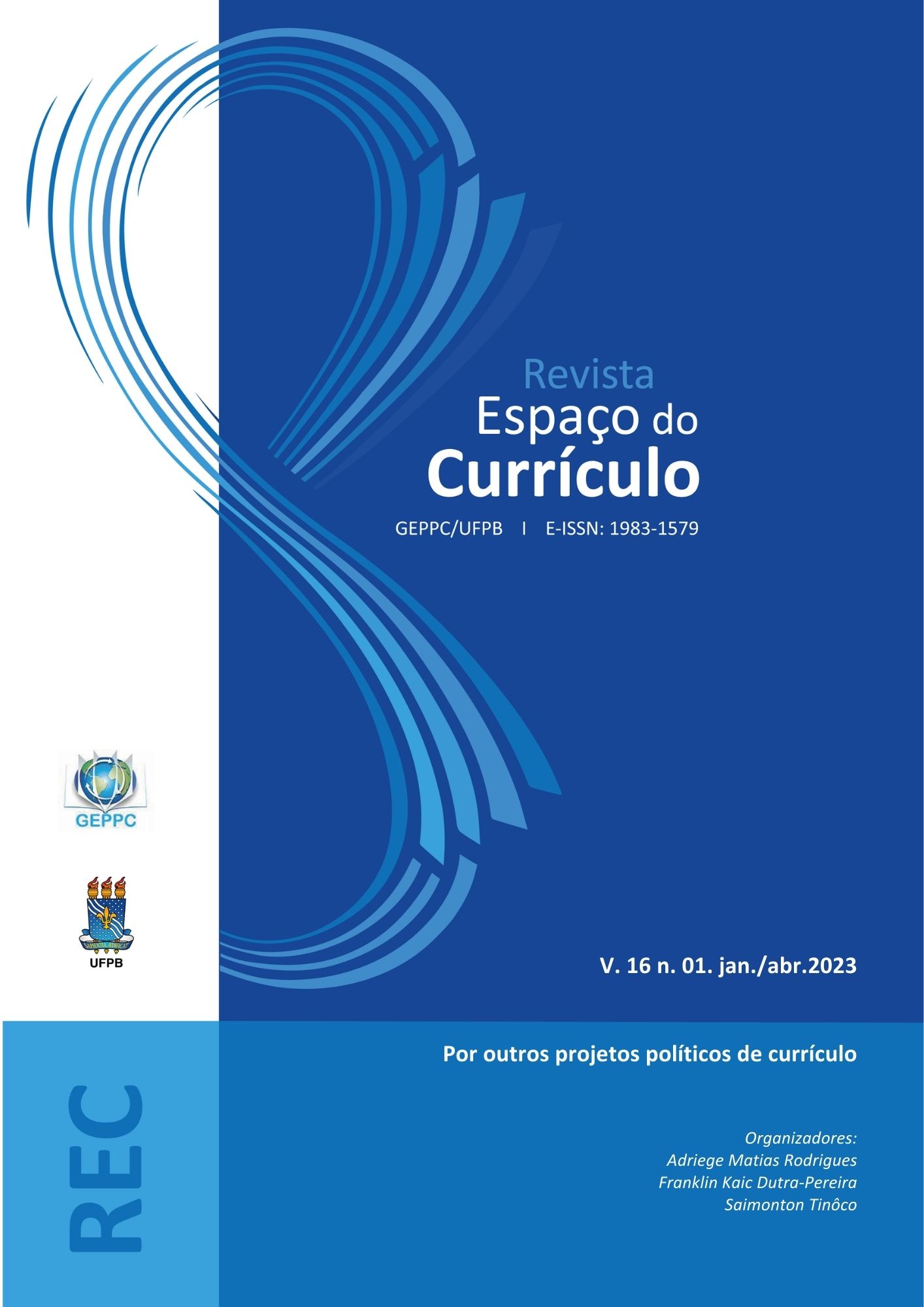AUTONOMY AND CURRICULAR INNOVATION
resisting, rethinking and crossing margins
DOI:
https://doi.org/10.15687/rec.v16i1.65494Keywords:
Curricular autonomy, Innovation, Collective resistance, Meaningful learningAbstract
The text focuses on the debate on educational theories and policies, arguing that they intend to control the thoughts and practices that develop in schools, in a kind of epistemological and ontological colonization of subjects. We propose, based on the interpretative bibliographic review, anchored in critical and post-critical assumptions and in our pedagogical practice, to reflect on the possibility of (re)construction of the subject from the the creation of spaces for resignifications and problematizations, enabling other forms of struggle for the construction of autonomy, causing and education with emancipatory and transformative overtones. We argue that the attempt to close the curriculum, assuming the possibility of control, tends to lose strenght in the face of contextual and ontological demands, wich reiterates the defense of the need for innovative resistance and questioning in the face of exogenous dictates on the part of teachers and of a curriculum with the insignia of diversity, whose significance has the strength to extrapolate margins and go in search of a still unknown island. The text hopes to contribute, stimulating more adventurous reflections, reaffirming the hegemony of the school, as a true space of resignifations and decision center of the rules of the curricular game.
Downloads
Metrics
References
ANGOLA. Decreto-Lei n.º 32/20, de 12 de Agosto. Fixa os princípios e as bases gerais do sistema de educação e ensino. Luanda. Parlamento Nacional, 2020 (Diário da República, 12 de agosto de 2020).
ANGOLA. Lei n.º 276/19, de 6 de Setembro. Fixa o Regime jurídico do subsistema de ensino geral. Luanda. Parlamento Nacional, 2019 (Diário da República, 8 Outubro de 2019).
ALBINO, Ângela. Autonomia curricular na voz docente: significações políticas. Revista e-Curriculum, São Paulo, v. 18, n. 3, pp. 1381-1402, jul./set, 2020. Disponível em: http://dx.doi.org/10.23925/1809-3876.2020v18i3p1381-1402. Acesso em: 27 nov. 2022.
ALVES, José; CABRAL, Ilídia. Uma outra escola é possível. Mudar as regras da gramática escola e os modos de trabalho pedagógico. Porto: Faculdade de Educação e Psicologia. Em Linha, 31 de Outubro de 2017.
CORAZZA, Sandra Mara. Pesquisar o currículo como acontecimento: em V exemplos. In: 27.ª REUNIÃO ANUAL DA ANPED, 27., 2004, Caxambu. Anais eletrônicos. Caxambu: ANPED, 2004. Disponível em: https://www.anped.org.br/biblioteca/item/pesquisar-ocurriculo-como-acontecimento-em-v-exemplos. Acesso em: 23 set. 2022.
CONTRERAS, José. A autonomia da Classe Docente. Porto: Porto Editora, 2003.
FREIRE, Paulo. Pedagogia da Autonomia: saberes necessários a prática educativa. Paulo Freire. São Paulo: Paz e Terra, 1996.
FULLAN, Michel.; HARGREAVES, Andy. Por que é que vale a pena lutar? - O trabalho de equipa na escola. Porto: Porto Editora, 2001.
GABRIEL, Andrea dos Santos.; SILVA, Sandra Kretli. De repente, uma pandemia: criação curricular e resistências coletivas como afirmação da vida. Revista Espaço do Currículo, v. 15, n. 3, p. 1-13, 2022. Disponível em: https://doi.org/10.22478/ufpb.1983-1579.2022v15n3.64595. Acesso em: 05 jan. 2023.
JULIÃO, António Luís. Autonomia curricular do professor em Angola: limites, desafios e possibilidades. Revista Contemporânea de Educação, v. 14, n. 29, jan/abr. 2019. Disponível em: http://dx.doi.org/10.20500/rce.v14i29.22155. Acesso em: 10 jan. 2023.
LOPES, Alice. Por um currículo sem fundamentos. Linhas Criticas, Brasília, DF. v. 21, n.º 45, pp. 445-466, mai./ago, 2015. Disponível em: https://doi.org/10.26512/lc.v21i45.4581. Acesso em: 29 set. 2022.
MOREIRA, António Flávio. Renovando a escola e o currículo. In MORGADO, José Carlos; QUITEMBO, Alberto Domingo (Orgs.). Currículo, Avaliação e Inovação em Angola: Perspectivas e Desafios. Benguela, Angola: Ondjiris Editores, 2014.
MELO, José Wilson Rodrigues. Direitos Humanos e Currículo Escolar: primeiras aproximações ao objeto de estudo. Revista Espaço do Currículo, v. 15, n. 1, p. 1-12, 2022. Disponível em: https://doi.org/10.22478/ufpb.1983-1579.2022v15n1.60918. Acesso em: 23 set. 2022
NIETZSCHE, Friedrich. Humano demasiado humano: um livro para espíritos livres. São Paulo: Companhia das Letras, 2005.
PACHECO, José Auguto. Currículo: Teoria e Práxis (3ª Ed.). Portugal: Porto Editora, 2001.
PERRENOUD, Philipe. Aprender a negociar a mudança em educação: Novas estratégias de inovação. Porto: Edições ASA, 2002
PARAÍSO, Marlucy Alves. Diferença no currículo. Cadernos de Pesquisa, v. 40, n. 1, p. 587-604, maio/ago. 2010. Disponível em: https://www.scielo.br/j/cp/a/MnrBfYmbrZ4zfVqD3C5qkYp/abstract/?lang=pt. Acesso em: 27 out. 2022.
ROLDÃO, Maria do Céu. Estudos de Práticas de Gestão do Currículo. Lisboa: Universidade Católica Editora, 2005.
SANTOS, Cláudia parecida. Processos de Criação em Currículos: “O Possível precisa Ser Inventado. Revista e-Curriculum, São Paulo, v. 20, n. 4, p. 1729-1749, out./dez. 2022. Disponível em: http://dx.doi.org/10.23925/1809-3876.2022v20i4p1729-1749. Acesso em: 07 jan. 2023.
SILVA, Tomaz Tadeu da (Org.). Identidade e diferença: a perspectiva dos estudos culturais. Petrópolis: Vozes, 2000.
SEBARROJA, Jaume Carbonnel. A aventura de Inovar: A mudança na escola. Porto: Porto Editora, 2001.
SARAMAGO, José. O conto da ilha desconhecida. Porto: Porto Editora, 1998.
SERRA. Orientação Curricular de Educação Infantil e Ensino Fundamental “Articulando Saberes, Tecendo Diálogos”. Serra: Secretaria de Educação, 2008.
UNESCO, Relatório Mundial. Investir na diversidade cultural e no diálogo intercultural. Direito Humano à Educação. 2009. Disponível em: http://www.dhescbrasil.org.br/index.php. Acesso em: 20/08/2022.
Downloads
Published
How to Cite
Issue
Section
License
Copyright (c) 2023 Curriculum Space Journal

This work is licensed under a Creative Commons Attribution 4.0 International License.
By submitting an article to Curriculum Space Journal (CSJ) and having it approved, the authors agree to assign, without remuneration, the following rights to Curriculum Space Journal: first publication rights and permission for CSJ to redistribute this article. article and its metadata to the indexing and reference services that its editors deem appropriate.
















